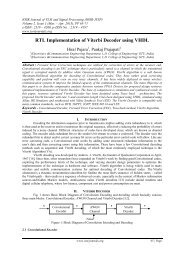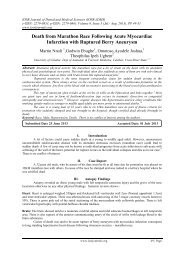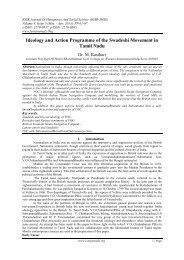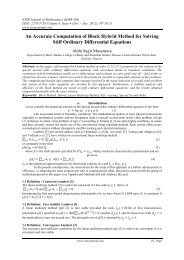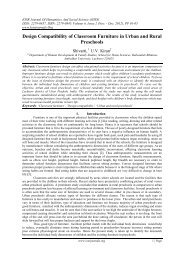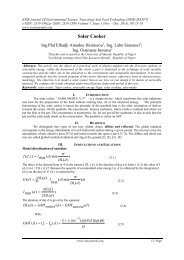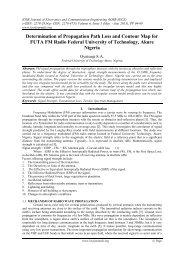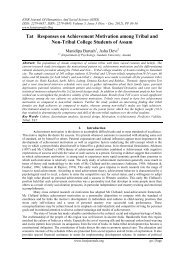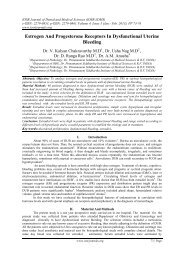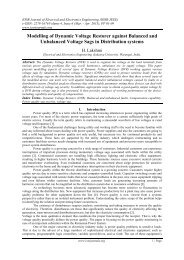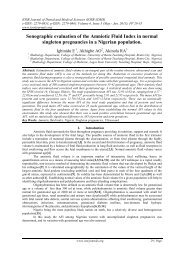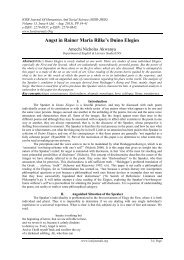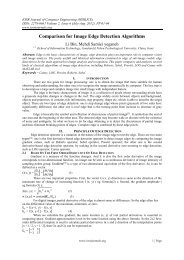Initial Conquest of India by Turks and Their Slaves - IOSR
Initial Conquest of India by Turks and Their Slaves - IOSR
Initial Conquest of India by Turks and Their Slaves - IOSR
You also want an ePaper? Increase the reach of your titles
YUMPU automatically turns print PDFs into web optimized ePapers that Google loves.
<strong>IOSR</strong> Journal Of Humanities And Social Science (JHSS)<br />
ISSN: 2279-0837, ISBN: 2279-0845. Volume 5, Issue 4 (Nov. - Dec. 2012), PP 15-22<br />
Www.Iosrjournals.Org<br />
Local perspective, aspiration <strong>and</strong> women empowerment in<br />
housing development in Africa: Nigeria<br />
Raimi A. Asiyanbola<br />
Department <strong>of</strong> Geography <strong>and</strong> Regional Planning, Olabisi Onabanjo University, Ago-Iwoye, Ogun State,<br />
Nigeria,<br />
Paper submitted for presentation at the First International Conference on Society, Technology <strong>and</strong> Sustainable<br />
Development organized <strong>by</strong> the Department <strong>of</strong> Social Work, Amrita Vishwa Vidyapeetham, Amritapuri Campus<br />
<strong>and</strong> School <strong>of</strong> Social Work, the University at Buffalo, State University <strong>of</strong> NewYork held at the Amrita Institute <strong>of</strong><br />
Medical Sciences, Kochi, <strong>India</strong> on June 3-5, 2011<br />
Abstract: The paper examines the local perspective on the involvement aspiration <strong>of</strong> women in housing<br />
development in Ibadan, Nigeria. The aim <strong>of</strong> the paper is tw<strong>of</strong>old. The first aim is an examination <strong>of</strong> the local<br />
perspective about women’s involvement in housing development. The second aim is an examination <strong>of</strong> the<br />
influence <strong>of</strong> local perspective on housing development involvement aspiration <strong>of</strong> women as indicated <strong>by</strong> the<br />
actual housing development involvement <strong>of</strong> women, women’s level <strong>of</strong> knowledge about the development <strong>of</strong> their<br />
household house, <strong>and</strong> women’s intension to be involved in housing delivery. The null hypotheses tested in the<br />
paper is that there is no significant relationship between the local perspective about women’s involvement in<br />
housing development <strong>and</strong> (i) actual housing development involvement <strong>of</strong> women, (ii) women’s level <strong>of</strong><br />
knowledge about the development <strong>of</strong> their household house, <strong>and</strong> (iii) women’s intension to be involved in<br />
housing delivery. The data used in the paper were derived from a larger household survey on gender <strong>and</strong><br />
housing study carried out <strong>by</strong> the author in Ibadan, Nigeria. Correlation statistical technique was used to test the<br />
hypotheses. The literature shows that the local perspective is that decisions on housing development are male<br />
dominated. Significant negative relationship is found between local perspective <strong>and</strong> (i) actual housing<br />
development involvement <strong>of</strong> women, (ii) women’s level <strong>of</strong> knowledge about the development <strong>of</strong> their household<br />
house, <strong>and</strong>, (iii) women’s intention to be involved in housing delivery. This result suggests that women<br />
empowerment could be greatly enhanced through a reorientation <strong>of</strong> the mindset <strong>of</strong> the society about some <strong>of</strong> the<br />
local perspective that hinders women’s involvement in development activities.<br />
Keywords: Local perspective; aspiration; women empowerment; housing development.<br />
I. Introduction<br />
Housing is universally acknowledged as one <strong>of</strong> the most basic human needs with a pr<strong>of</strong>ound impact on<br />
general well-being. According to the definition given <strong>by</strong> the World Health Organization (WHO), housing is a<br />
residential environment that includes the physical structure that man uses for shelter, all necessary services,<br />
facilities, equipment, <strong>and</strong> devices needed or desired for the physical <strong>and</strong> mental health <strong>and</strong> social well-being <strong>of</strong><br />
the family <strong>and</strong> individual. It is therefore critical for the achievement <strong>of</strong> health for all, employment, social<br />
stability <strong>and</strong> economic development. As a prerequisite for survival, housing only ranks second to food<br />
(Onibokun, 1985; Adeniyi, 1985). It is also one <strong>of</strong> the indicators <strong>of</strong> a person‟s st<strong>and</strong>ard <strong>of</strong> living <strong>and</strong> <strong>of</strong> his<br />
place in society. Housing reflects the cultural, social <strong>and</strong> economic values <strong>of</strong> a society as it is the best physical<br />
<strong>and</strong> historical evidence <strong>of</strong> civilization in a country (Onibokun, 1985).<br />
Housing encompasses far more than living space <strong>and</strong> shelter (Knox, 1992). Its nature <strong>and</strong> value are<br />
determined <strong>by</strong> its varied services, which include neighbourhood amenities, access to education, health facilities<br />
<strong>and</strong> security, in addition to shelter. The worth <strong>of</strong> housing depends upon quality consideration, such as design,<br />
density, building materials <strong>and</strong> floor spaces <strong>and</strong> on access to employment <strong>and</strong> other income earning<br />
opportunities, public facilities, community services <strong>and</strong> market. Housing is a durable good unlike most<br />
consumer goods. It is a fixed location asset <strong>and</strong> it constitutes the largest space user in the city <strong>and</strong> has played a<br />
major role in shaping urban regions (Harthorn, 1992).<br />
In recent years, various countries <strong>of</strong> the world <strong>and</strong> different international bodies have recognized the<br />
significance <strong>of</strong> the involvement <strong>of</strong> women in development <strong>and</strong> have devoted considerable attention to women‟s<br />
contribution to economic progress. These countries <strong>and</strong> organizations have emphasized the need to actively<br />
involve women in the design <strong>and</strong> implementation <strong>of</strong> various development programmes so as to make them more<br />
active <strong>and</strong> effective participants in the socio-economic cum cultural activities <strong>of</strong> their countries <strong>and</strong>/or<br />
associations (Agbola, 1990a; 1990b; Moser, 1992, 1993; Young, 1995; UNCHS, 1996; etc).<br />
Although there has been increased focus on the actual <strong>and</strong> potential involvement <strong>of</strong> women in<br />
development generally <strong>and</strong> with special emphasis on agriculture <strong>and</strong> the industry, only in recent times has there<br />
www.iosrjournals.org<br />
15 | Page



